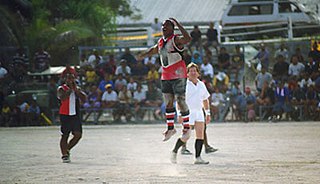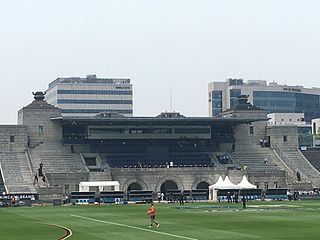The Australian Football International Cup is a triennial international tournament in Australian rules football. It is the biggest international tournament in the sport that is open to all nations. More than 26 nations have participated and the competition has expanded into multiple pools and both men and women's divisions. At the time of the last tournament in 2017, the sport had a record 170,744 registered players outside Australia growing at a rate of 25 per cent per annum.
AFL Japan is a league and governing body for Australian rules football in Japan. The Top League season runs from April to November, with a summer break during August. All teams including the University teams compete in the Top League. The most successful team has been the Tokyo Goannas, who have been premiers since the inaugural Top League season. In 2007, the Osaka Dingoes joined the Top League. Since then the league has expanded with the addition of 3 new teams with the Nagoya Redbacks joining in 2009, the R246 Lions joining in 2012 and just recently the Tokyo Bay Suns in 2013.

The Geography of Australian rules football describes the sport of Australian rules football played in more than 60 countries around the world. By 2017 more than 26 nations had contested the Australian Football International Cup, the highest level of worldwide competition.

The Canada national Australian rules football team represents Canada in Australian rules football. The men's side is known as the Northwind while the women's side is known as the Northern Lights. The national team is selected by AFL Canada the governing body for Australian rules football in Canada.

The Irish national Australian rules football team represent Ireland in Australian rules football and is selected from the best Irish born and raised players primarily from the clubs of the Australian Rules Football League of Ireland but also playing abroad.

The Nauru national Australian rules football team, nicknamed the Chiefs, represents Nauru in Australian rules football. Despite its small size and population, Nauru, which is the only country with AFL as its national sport, consistently ranks among the top eight teams in the world.
Australian rules football in Japan describes the development of the team sport which dates back to 1910, but found its roots in the late 1980s mainly due to the influence of Australian Football appearing on Japanese television.

Australian rules football in Papua New Guinea (PNG) is a developing team sport which was initially introduced by Australian servicemen during World War II. The governing body for the sport is the PNG Rules Football Council, with the development body being AFL PNG. The junior development version is known locally as Niukick. Regionally, AFL PNG is affiliated with AFL Oceania.

The 2008 Australian Football International Cup was the third time the Australian Football International Cup, an international Australian rules football competition, has been contested.

Note: In order to be recognised as a true national team and not simply expatriates, the list is subject to International Cup eligibility rules.

Australian rules football in China has been played since the 1989 and grew in popularity in the 2010s.

Australian rules football in Oceania is the sport of Australian rules football as it is watched and played in the Oceanian continent. The regional governing and development body is AFL South Pacific it is affiliated to the AFL Commission and was formed in 2008.
Australian rules football in Asia dates back to 1910 but was only sporadically played until the 1980s after which it has boomed. Clubs have begun in most Asian countries and a governing body for the region, AFL Asia was formed in 2008 to coordinate the Asian Championship and promote its affiliated leagues. AFL Asia estimates that there are now more than 10,000 Australian Football players across the continent.

Australian rules football is played in Europe at an amateur level in a large number of countries. The oldest and largest leagues are those in the United Kingdom, Ireland and Denmark, in each of these nations there are several established clubs, and organised men's, women's and juniors programs. The British AFL has now expanded into Welsh, Scottish and English leagues. The Danish AFL has been responsible for the expansion of Australian Football into Sweden, Finland, Iceland and Norway. The governing body for Australian Football in Europe was founded in Frankfurt in January 2010; the body was initially called the European Australian Football Association, but changed its name to AFL Europe at a general assembly meeting in Milan in October of the same year. It currently has 22 member nations. AFL Europe, with backing of the AFL in Australia has overseen a large improvement in the organisation of Australian football in Europe.
Australian rules football in the Middle East describes the minority sport of Australian rules football as it is watched and played in the Middle East region.
AFL Canada is the governing body for Women's Australian rules football competition in Canada. The primary competition is centred in the Canadian provinces of Alberta, British Columbia, Ontario and Quebec and the national team is known as the "Northern Lights".
Australian Rules Football was played by three clubs in Iceland, with the Andspyrnusamband Íslands being the main league and controlling body for the sport. The IceAFL was founded in 2009, and regular competition commenced in 2010. The league was the world's most northerly Australian Rules Football league. Since the inaugural Arctic Cup competition Australian Rules Football hasn't been played in Iceland.
Paul Sharry is a Gaelic footballer who plays for the Westmeath county team.
The 2017 Australian Football International Cup was the sixth edition of the Australian Football International Cup, a triennial international Australian rules football competition run by the Australian Football League (AFL).

The Philippines national Australian rules football team, nicknamed the Philippine Eagles represents the Philippines internationally in Australian rules football.











